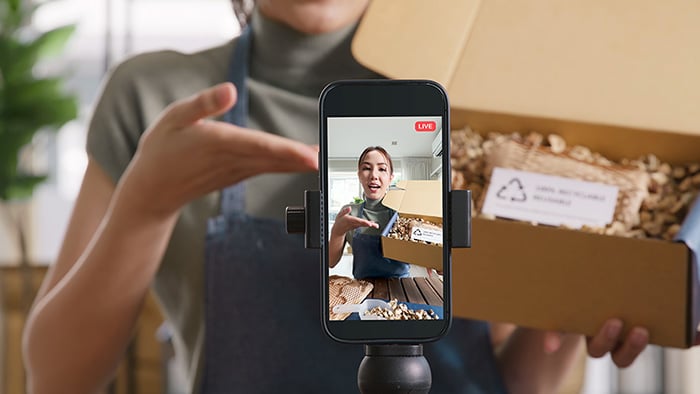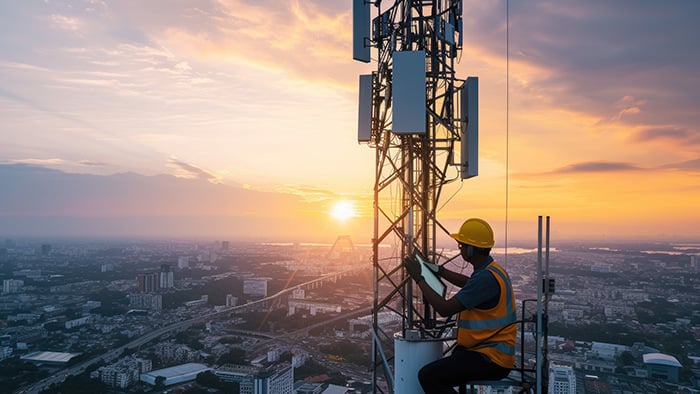What exactly makes a smart TV smart? The same things that likely convinced you to buy one — personalization, facial recognition, voice commands, video chats, and digital home connectivity. But a smart TV’s internet connectivity also makes it a liability.
Is your smart TV watching you?
Yes, your smart TV is watching you, in the sense that it collects data about what you watch. Smart TV surveillance uses automatic content recognition (ACR) to gather data about your viewing habits. Your smart TV may also have a smart TV camera and microphone to help with data collection.
A basic question to ask is: Does my smart TV have a camera? If yes, then your smart TV camera is watching you — but not always in a creepy way. A smart TV camera is required to give you the advanced features you willingly signed up for: video chat, facial recognition, gesture control, and so on.
But smart TV companies also sell the data they collect to advertisers. And cybercriminals can use your Wi-Fi network to hack your smart TV, gain access to your smart home, or even threaten you with ransomware.
Do smart TVs have cameras?
Yes, some smart TVs have built-in cameras, but it depends on the model of the TV. If your smart TV has a camera, it will be listed in the owner’s manual — you don’t need to worry about covert cameras concealed in your device.
If your TV offers facial recognition or video chat, then yes, your smart TV has a camera. In this case, you’ll want to learn how to disable smart TV spying. A good place to start is with the basics of webcam security. All types of webcams can get hacked, including the webcam on your smart TV.
Where is the camera on my smart TV?
Smart TV cameras are often housed in the center of the top bezel, the rim around the TV screen. To find the camera on a Samsung smart TV, look for a small circular lens on the top edge of the screen.
If you're looking for the camera on your LG smart TV, or searching for the Samsung smart TV camera location, well, there might not be one. Most LG smart TVs do not have built-in cameras.
To keep up with modern smart TV design, camera-equipped LG smart TVs may have a retractable lens — making it even harder to find the camera. Run your finger across the top edge of the TV and feel for an insert. That may be the best way to find a camera on Samsung smart TVs and other TVs with retractable lenses.
/How-to-stop-your-smart-TV-from-spying-on-you-02.png?width=900&name=How-to-stop-your-smart-TV-from-spying-on-you-02.png) Smart TVs come with or without built-in cameras.
Smart TVs come with or without built-in cameras.
What is smart TV spying?
Smart TV spying happens when your internet-connected TV collects data about what you watch. Smart TVs collect massive amounts of data ostensibly to improve your viewing experience, while also monetizing this data through targeted advertising.
Though your smart TV is spying on you, most people don’t know how much data smart TVs collect, how that data is used, and how it impacts their lives beyond the TV screen — a potentially significant IoT security risk. Because many people connect all their smart devices to a single Wi-Fi router, a hacker can access your entire network by hacking one smart appliance or router.
Avast One comes with a built-in Wi-Fi inspection feature that monitors your network and alerts you if any of your devices are vulnerable to attack. It’s just one of the many advanced protections you’ll get with Avast, 100% free.
See what our in-house Avast hackers pulled off while hacking a smart coffee machine and installing ransomware on other devices. Like a smart coffee machine, smart TVs are susceptible to malware too.
/How-to-stop-your-smart-TV-from-spying-on-you-01.png?width=900&name=How-to-stop-your-smart-TV-from-spying-on-you-01.png) One vulnerable smart device puts the entire home at risk.
One vulnerable smart device puts the entire home at risk.
What type of data do smart TVs collect?
Smart TVs collect data by watching what you watch, including your cable, satellite, streaming, online TV, and even video game preferences. Smart TV surveillance uses technology called automatic content recognition (ACR) to collect this data and sell it to advertisers and data brokers.
Your viewer profile is bundled with demographic data (age, ethnicity, gender, education) and your IP address, which gives specific information about your location and potentially your socioeconomic status. You can then be targeted across multiple devices — smart TV, mobile phone, and desktop — for products that fit your consumer category.
Companies say that this data collection is used to improve customer and viewing experiences, but many smart TVs can also monitor you in ways you don’t realize. Smart TV spying also refers to the illegal breach of a Wi-Fi network to gain access to your TV.
How can a smart TV spy on you?
Smart TVs can spy on you in three key ways:
-
ACR technology: spying by collecting data about what you watch.
-
Smart TV camera: spying with video.
-
Smart TV microphone: spying by listening.
The ways smart TVs spy on you — legal or illegal — have major implications. All forms can be considered snooping and breaches of privacy, but the distinction comes down to your knowing consent.
By design, it’s easy to inadvertently consent to having your data collected and sold to advertisers. You can deactivate many of these spying features, but you’ll be going without all the bells and whistles that make your TV “smart.” Each company calls their spying feature something different — Viewing Information Services (Samsung), Viewing Data (Vizio), Live Plus (LG), or Samba Interactive (Sony).
But nobody consents to their smart TV being hacked and turned into a spying device. That's why it’s so important to secure your home Wi-Fi network with a strong cybersecurity tool. Avast One detects weaknesses in your home Wi-Fi network to keep hackers out of your smart TV and other devices.
How to stop your smart TV from spying on you
To stop your smart TV from spying on you, disable ACR technology, block built-in cameras, and turn off built-in microphones. These three steps will establish a baseline of privacy and security in your smart home. Also, follow the FBI’s smart TV security tips.
Whether you have a Samsung, Vizio, LG, or Sony TV, here are the most important ways to keep your smart TV from spying on you:
-
Understand the features of your smart TV and how to limit them. Start with a basic internet search of your TV model number and the words “microphone,” “camera,” or “privacy.” For example, search “LG smart TV 55LA8600 privacy” or “Samsung smart TV UA46F8000AR camera.”
-
Don't rely on default security settings. Change passwords if possible and learn how to disable microphones, cameras, and personal data collection. If you can’t, consider getting a different TV.
-
Place a piece of black tape or thick cardboard over the camera lens for a DIY camera hiding option that even Mark Zuckerberg uses. If you can't find the camera but know it's there because your TV offers integrated video chat, open a video chat app (like Skype) and move the piece of cardboard around until you black out the screen.
-
Check to see if the smart TV manufacturer offers security patches. Have they issued security patches in the past to prevent vulnerabilities from being exploited? If possible, turn on automatic software updates for your smart devices.
-
Check the privacy policy of your smart TV from the TV manufacturer and also for the streaming services you use. What type of data do they collect, how is it stored, and what do they do with it?
If you’re interested in learning how to build a smart home, also learn how to protect that smart home with the following security measures:
-
Prioritize smart home cybersecurity. Protect your smart home from the moment you set it up.
-
Take a comprehensive approach to smart home security. Protect all the devices in your home, because each device is a potential vector of vulnerability.
-
Secure your home router, it's the key access point to all connected devices. Use strong antivirus software to keep hackers off your Wi-Fi and away from your devices. Install Avast One on your computer or phone to protect your home network against intruders. It's the easiest way to stop a spy in their tracks and remove your smart TV as an access point for hackers.
Disable ACR technology
ACR (automatic content recognition) comes standard on most smart TVs, letting them automatically recognize the content you’re viewing. ACR technology matches snippets (audio and visual) of what you’re watching with a vast reference library of nearly everything on TV. The library works by “watching” TV, cataloging the input, then matching that against its stored data.
Viewing data is then shared with the TV manufacturer, sold to advertisers (depending on the manufacturer’s terms and conditions), and used to target you with ads. Your smart TV is likely connected to your home router, so advertisers know your IP address and location.
And because you probably use that same router to connect to the internet from other devices, data collected from ACR can also be used to target you on your smartphone, laptop, and desktop.
Here's how to turn off ACR technology on your Samsung Smart TV, Vizio Smart TV, LG Smart TV, and Sony Smart TV.
How to disable ACR technology on Samsung Smart TVs
Samsung smart TV tracking has three main elements: ACR technology, which they call Viewing Information Services, internet-based advertising, and voice recognition services. To stop Samsung TV spying, we suggest turning off all three options — though changing these Samsung smart TV security settings may limit the functions of your TV.
Here’s how to disable ACR on Samsung smart TVs (newer models):
-
Go to the Main menu.
-
Navigate to the Settings icon.
-
Go to Support.
-
Select Terms & Policies.
-
Turn off Viewing Information Services (what Samsung calls ACR).
Here’s how to disable ACR on older Samsung Smart TV models (pre-2019):
-
Go to the Smart Hub menu.
-
Select the Settings icon.
-
Go to Support.
-
Choose Terms & Policy.
-
Go to SyncPlus and Marketing.
-
Select the option to disable SyncPlus.
How to disable ACR technology on Vizio Smart TVs
Vizio TV spying is well-documented. The company was accused by the Federal Trade Commission of illegally tracking 11 million customers and selling this data to third parties. Furthermore, the FTC claims that Vizio added specific demographic information to the Vizio ACR viewing data.
Here’s how to turn off Vizio viewing data:
-
Go to the Main menu.
-
Find Settings.
-
Choose Systems.
-
Go to Reset & Admin.
-
Locate and highlight Viewing Data.
-
Use the right arrow to toggle off viewing data.
On older versions of Vizio smart TVs, Viewing Data is called Smart Interactivity. The steps listed above are the same for all models, but look for Smart Interactivity instead of Viewing Data.
How to disable ACR technology on LG Smart TVs
The LG privacy policy has several components, which are found within their User Agreement section. To stop LG spying, turn off more than just Live Plus, LG's name for ACR. Also block interest-based advertisements and viewing information.
Here’s how to turn off ACR on LG smart TVs:
-
Push the Settings button on the remote control.
-
Scroll down to All Settings.
-
Select General.
-
Choose the option About This TV.
-
Scroll down to User Agreements.
-
Turn off the Live Plus User Agreement.
Note that turning off viewing information limits access to program recommendations, including LG options with dozens of free streaming channels from their partner company Xumo.
How to disable ACR technology on Sony Smart TVs
As of 2018, most Sony smart TVs run on Google’s Android platform. There is no opt-out option from Google's privacy policy. It's either accept and use a Sony smart TV, or don't. But Sony's smart TV ACR technology is powered by Samba TV, which is regulated under the Sony Bravia privacy policy.
Here’s how to disable ACR on Sony Smart TVs:
-
Press the Home button on your remote control.
-
Select Settings.
-
Go to System Preferences and select Interactive TV Settings or Samba Interactive TV (depending on the TV model).
-
Select Disable or Off on Interactive TV.
Disable cameras and voice recording
After you stop smart TV surveillance by disabling ACR technology, consider turning off cameras and microphones. TV manufacturers and hackers can use smart TV cameras and microphones to spy on TV owners, getting direct access to your home.
If you’re a smart TV owner wondering if your Vizio smart TV has a camera, don't stress, there are several smart TV manufacturers that don't have built-in cameras or microphones — such as most Vizio smart TVs and Sony smart TVs.
Video surveillance is a disturbing way for hackers to breach your privacy. They can gain access to your smart TV via weak security on your Wi-Fi network.
If just one of your smart home appliances gets hacked, your entire interconnected home becomes vulnerable. Powerful antivirus software can monitor your network for security vulnerabilities or unwanted intrusions.
How to disable cameras and voice recording on Samsung Smart TVs
Some Samsung smart TVs have always-on voice detection, similar to smart speakers like Amazon Echo or Google Home. But most Samsung TV microphone models require you to press a microphone button on the remote before using voice commands.
Here’s how to disable the voice recording feature on your Samsung smart TV:
-
Go to Home.
-
Open Settings, then System.
-
Open Expert Settings.
-
Turn off Voice Interaction.
On older Samsung smart TVs, you might find these controls under Smart Features (Voice Recognition) within Expert Settings options.
Another option for ensuring your Samsung TV can't spy on you is to “Disagree” with the Terms & Policies outlined within the Support panel. Select Disagree to Viewing Information Services, Voice Recognition Services, and Nuance Voice Recognition and Privacy Notices.
Samsung smart TV spying via camera is easily stopped by blocking your camera with a piece of black tape. Newer versions of Samsung smart TVs have retractable cameras, so if the camera is down, it can’t record you. Unless you’re using facial recognition or gesture controls, turn off your Samsung smart TV camera.
How to disable voice recording on LG Smart TVs
LG promises no active listening, and as with the Samsung TV microphone, you must activate the listening feature before using voice commands. LG smart TVs have voice recognition technology and a microphone built directly into the LG Magic Remote. You don't have to shout your commands from across the room, you just speak normally, assuming your remote is closer than your TV screen.
Even without active listening, some people want to turn off LG TV voice recording. Here's how it's done.
-
Go to Settings.
-
Go to General.
-
Select About This TV.
-
Go to User Agreements.
-
Opt out of Voice Information to disable voice control.
Protect your privacy at home with Avast
The steps outlined above will help you gain control over your connected home and stop smart TVs spying on you. Now, check your entire network and all your devices for security holes with Avast One.
Avast One provides comprehensive protection against the array of today’s online threats. With powerful anti-malware detection, an ironclad firewall against unwanted network intrusion, and a suite of privacy protections to safeguard your personal data, Avast One does it all. Protect your devices and your network with the security solution trusted by millions of people around the world.


/How-to-stop-your-smart-TV-from-spying-on-you-Hero.jpg?width=1200&name=How-to-stop-your-smart-TV-from-spying-on-you-Hero.jpg)
/How-to-stop-your-smart-TV-from-spying-on-you-02.png?width=900&name=How-to-stop-your-smart-TV-from-spying-on-you-02.png) Smart TVs come with or without built-in cameras.
Smart TVs come with or without built-in cameras./How-to-stop-your-smart-TV-from-spying-on-you-01.png?width=900&name=How-to-stop-your-smart-TV-from-spying-on-you-01.png) One vulnerable smart device puts the entire home at risk.
One vulnerable smart device puts the entire home at risk.










